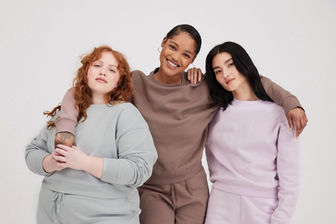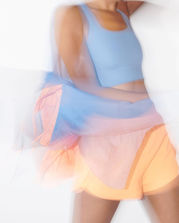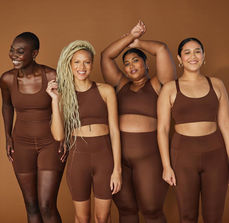
GIRLFRIEND COLLECTIVE
WATCH MORE
FOUNDING STORY
FOUNDER(S) & LEADERSHIP
Quang Dinh, Co-Founder & CEO
Ellie Dinh, Co-Founder & Creative Director
It was Ellie Dinh's own struggle to find leggings that were, all at once, cute, comfy, and ethically made, that alerted her to a need in the athletic apparel market. In 2016, Dinh and her husband Quang launched Girlfriend Collective out of Seattle. "Almost all synthetic fabrics, like polyester and nylon, are made from plastic," explains Girlfriend Collective, who actually offers mini educational breakdowns on complex scientific processes like polymerization and recycling on their website. The brand generated virality in a pre-launch social media campaign, offering free $78 leggings to anyone who shared their Instagram post and paid the $20 shipping fee. Risky but gutsy, the marketing strategy (leveraging their entire budget!) was a huge success, receiving over 10,000 orders on the first day and crashing the website on the second. This media move was so effective in sparking word-of-mouth interest because instead of using an ad to tell us why we need their product, they showed us. People fell in love with, not just the product, but the brand's commitment to using recycled materials and being as transparent as possible, and a genuine organic community was galvanized. Since then, the athleisure startup has been setting the bar in eco-conscious sportswear, offering size-inclusive (XXS-6XL) bras, leggings, swimwear, among other male and female apparel items available in a regal palette of solid earth tones.
ETHICAL PRACTICES
CERTIFICATIONS
manufacturer in Hanoi, Vietnam
NOTABLE METRICS
7,692,445 water bottles recycled
7,518,004 lbs of CO2 prevented
13,512,208 gallons of water saved
Girlfriend Collective has been honing its ethical practices since the company's inception in 2016 by thoughtfully sourcing all materials, production practices, and production partners. Girlfriend Collective recycles100% post-consumer plastic waste (mainly water bottles collected in Taiwan) to be used as a fabrication source. This innovative approach is an aid to the environment, a fundamental aspect of the company's DNA, and a key competitive advantage. Each pair of leggings is made from 25 recycled water bottles and each bra is made from 11.
Girlfriend Collective holds themselves accountable by engaging with third-party audits monitoring things like material sourcing, ensuring living wage payment for their production employees, and accurately measuring their carbon impact. The brand uses transparency and sincerity to connect with its loyal community of eco-conscious shoppers and publishes its certification documents. And beyond, Girlfriend Collective engages with communities dedicated to social movements that are important to the brand's ethos. Supporting the Black Lives Matter movement has been at the center of Girlfriend Collective's giveback efforts. By creating entire product campaigns where 100% of profits were donated, Girlfriend Collective has been able to support 10+ different nonprofit organizations (or Giveback Partners).
Girlfriend Collective sources their textiles from a facility in Taiwan using high-quality, 100% recycled materials which are certified by Oeko-Tex. Oeko-Tex traces the origin and contents of materials while also ensuring each fabric is safe to wear on the skin. All materials are also BluSign certified which verifies that all textiles have been processed sustainably and in healthy, safe environments for people. Calling themselves mother Earth's number one fan, Girlfriend Collective prioritizes their environmentally-friendly practices in everything that they do. All Girlfriend Collective packaging is a reusable, recyclable pouch that is made from 100% recycled material, and here's a breakdown of the materials used by Girlfriend Collective today:
-
RPET is the stretchy compression material (79% recycled polyester + 21% spandex) used to make core compressive leggings, bras, and reusable pouch
-
ECONYL® yarn is a recycled fiber made from plastic and other waste that would otherwise be discarded into oceans and landfills (and check out this video to see the process!). The yarn is made in a zero-waste, zero-emission facility in Japan (before it gets constructed at a SA8000-certified factory in Hanoi)
-
LITE fabric is made from recycled fishing nets and other waste using ECONYL® yarn (83% recycled nylon + 17% spandex) used to make LITE leggings
-
Cupro is a delicate fiber made from waste the cotton industry leaves behind and used to make Girlfriend Collective tees and tanks, which are 100% Cupro
On Girlfriend Collective's site, consumers can access expansive educational resources about the company; from the material breakdown of products to how to join their community of environment lovers. Using layman's scientific language, they explain that synthetic material derived from plastic will release microplastics into our waterways when laundered. Microplastics are recognized as a dire concern by scientists around the world as they have already caused irreversible harm infiltrating the Earth's rivers, oceans, and the global food chain. Even though Girlfriend Collective's products are made with recycled plastic, they too will litter microplastics in the wash. Impressively, Girlfriend Collective has addressed this issue by teaching consumers about different solutions like washing synthetic clothes in washing bags. Girlfriend Collective also sells a $45 Microfiber Filter that you can attach to your standard washing machine at home.
Recognizing that everyone eventually parts ways with old products, Girlfriend Collective started a recycling program called ReGirlfriend. By sending in old products, you will receive a $15 credit toward your next purchase. Behind the scenes, Girlfriend Collective will break down and regenerate the fibers from your old items to be used in the production of new pieces. A company called Unifi based in North Carolina helps them with this recycling process.




